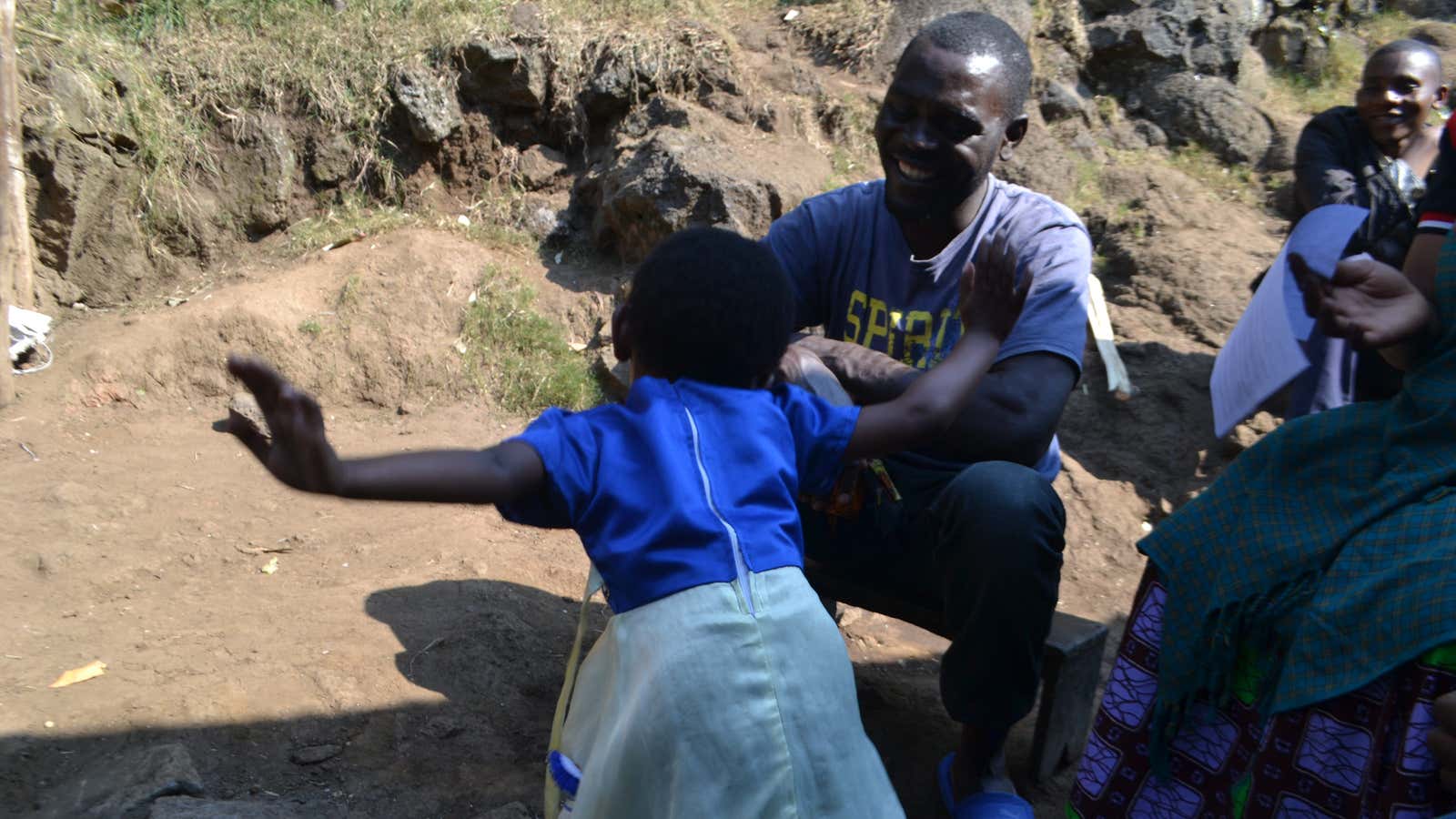Like many three-and-a-half year olds, Odille Igirimbabazi loves to sing and dance. On a recent morning in her home, wearing her favorite blue and yellow dress and clutching a doll that her dad, James, made for her, she sings religious songs and sways energetically as James watches, claps, and smiles, tapping his feet. When she finishes, he scoops her up into his arms to tell her how proud he is. “Bravo!”
If this seems a common family scene, in Rwanda it is not. Mothers, not fathers, are deemed to be children’s caregivers, and violence between parents and children, and husbands and wives, is common. In a 2010 survey conducted by Promundo, a nonprofit, 57% of women said their partners were violent with them. Men in Rwanda “are kind of seen as a threat to children rather than a support to children,” says Gary Barker, president of Promundo.
A team of government officials, nonprofits, and academics is trying to change that with Sugira Muryango (“Strengthening Families”), a program to help parents—especially fathers—become more supportive caregivers. By improving relationships in the home, the group hopes to reduce violence, support the development of children, and ultimately reduce poverty in Rwanda.
James Turikumwe, Odille’s father, offers one example of how fathers can be willing to invest more in their families when they understand the power they have. James communicates openly with Odille, encourages her to talk to visitors, and helps her feel comfortable in an unfamiliar situation. That’s something he learned from Jean de Dieu Sindayigaya, the family’s Sugira Muryango coach. “It has increased our love in our family,” says James about the program. Indeed, the program has shown promising results, helping to increase both parents’ engagement with their kids, reduce violent discipline between parents and children, and improve families’ nutrition, hygiene, and sanitation practices.
If Sugira Muryango sounds ambitious, so is Rwanda’s goal to put children and families at the center of its development policies. The resource-poor Central African nation went through a genocide two decades ago that left many traumatized. The legacy of the genocide, says Freya Zaninka Declercq, a head of department at Rwanda’s National Early Childhood Development Program (NECDP), has fueled the country’s unusually ambitious investment in children and families, with a special focus on educating parents to take better care of their children—and of each other.
“When you invest in early childhood, it’s the best way to invest in the future,” she says. “If we want to achieve that goal of bringing people out of poverty, we really have to start at the very beginning.”
Expanding Sugira Muryango means relying on a volunteer workforce, and trying not to sacrifice quality in order to reach more people. But the benefit, supporters say, goes beyond reducing poverty to empowering half the population: fathers.
The background
Historically, social policies and programs aimed at helping poor children and families have focused almost exclusively on mothers. “‘Parenting’ has almost always meant ‘mothering,’ or ‘female caregivers,’ and fathers were and have been seen as the other,” says Promundo’s Baker.
That’s because mothers typically spend more time with their babies, as well as taking on the lion’s share of home and childcare responsibilities. UK-based research group Overseas Development Institute (pdf) compared the average amount of time women and men spent on childcare across 66 countries in 2014 and found that women spent 3.3 times as much time as men on unpaid care.
But researchers are starting to understand the important role fathers can play in their children’s development. In the first 1,000 days of life, children’s brains are built through experience, most notably meaningful interactions with loving, caring adults around them. When babies are deprived of those experiences, or even worse, exposed to neglect and abuse, their immune systems and brains don’t always develop in the best way.
Decades of research on infants and toddlers shows that “one dedicated, focused caregiver who’s able to meet the emotional, cognitive, physical development needs of a child, is absolutely fundamental,” says Barker. And two “is better than one.” Babies who grow up with absent or violent fathers often suffer serious long-term consequences; those who have supportive, present, and loving fathers generally benefit.
Rwanda is becoming a key place to test how this could work in a country where violence is still common and men are not expected to be caregivers. It has a national policy and strategic plan (pdf) for early childhood development (ECD) and a dedicated government entity—NECDP—whose role is to coordinate the programs and investments tied to that plan (a rarity even in high-income countries). It has set ambitious goals for itself: cut child stunting rates by more than half by 2024; more than double the number of children between three and six who access ECD services in the country by 2024; and increase the availability and quality of ECD and education services across the country. The ultimate vision of the policy, in NECDP’s words, is that “every child has access to comprehensive, integrated and quality care that allows for their full survival, growth and development.”
For that to happen, a lot needs to change. According to NECDP, in 2017 only 17% of kids between three and six years old were attending a community, home-based, or center-based setting where ECD services were provided. And the stunting rate, one of Rwanda’s most stubborn problems, was about 38%. (In 2017, the world average was about 22%.) In fact, the idea of investing in little kids started as a way to reduce Rwanda’s malnutrition and stunting problems, says Declercq.
In 2000, the country’s leaders laid out a vision for Rwanda (pdf) to become a middle-income country by 2020, “in which Rwandans are healthier, educated and generally more prosperous.” Investing in children under the age of six and their mothers, says Declercq, is part of this vision, which comes directly from the highest levels of government. The prime minister reviews the progress made on the national ECD policy every quarter, and the president and his wife have spoken about the importance of ECD.
Ambitious experiments around the world, from Brazil to Turkey, have shown that “teaching poor parents how to love and nurture their infants will dramatically influence what kind of adults they become,” writes Jenny Anderson in Quartz. When dads contribute to the running of their households, treat their partners with respect, take good care of their kids, play with them, and nurture them, families are stronger and everybody benefits.
But these interventions have to contend with complex social and cultural dynamics around gender roles. In 2010, Promundo and the Rwanda Men’s Resource Centre conducted a survey on masculinity and gender-based violence. The household survey reached 1,311 women and 2,301 men between 18 and 60 years old across the country’s five provinces, in addition to in-depth interviews with five focus groups. It showed that most men and women have very traditional views of their roles and rights in the home. For example, 73% of men and 82% of women “totally agreed” with the statement, “a woman’s most important role is to take care of her home.”
Meanwhile, 33% of men reported having sexually abused a girl while they were in high school. And 44% of men—and importantly, 54% of women—agreed that “a woman should tolerate violence in order to keep her family together.”
About 45% of men who responded to the survey said they saw their dads beat their moms in childhood and, of those, 38% said they became violent towards their partners as adults. The survey concluded that men who witnessed this kind of violence at home as children were more likely to perpetuate it—proving that kids emulate behavior, both good and bad.
The program
Enter Sugira Muryango, a home-visiting program that targets the poorest households with children under the age of three. The program is a collaboration between researchers at Boston College’s School of Social Work and the nonprofit FXB Rwanda.
The proposition underlying Sugira Muryango is simple, but also radical: that fathers’ love can play a role in reducing poverty. Though it began as a very small pilot study with 60 families, last year researchers expanded the program into a cluster randomized trial (CRT) with 1,049 households. The program lasted four months, between June and September 2018, followed by two “booster visits” in late 2018 and early 2019.
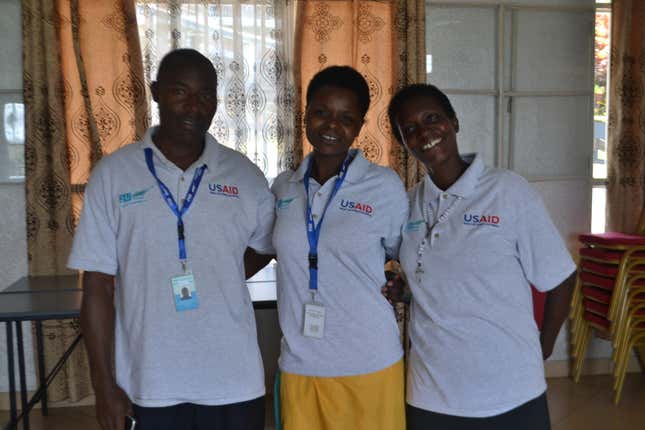
More than 100 coaches trained by FXB Rwanda and hand-picked from villages in three districts (Rubavu, Nyanza, and Ngoma) were put in charge of five households who have at least one child between six months and three years old. All of the families were classified as Ubudehe 1, meaning the poorest in Rwanda.
Coaches visited the 549 households in the treatment group every week and taught parents about hygiene, sanitation, nutrition, medical care, conflict resolution, child-rearing, and child development. The curriculum comprised 12 modules, which focused on things such as why reading and talking to babies matters, and managing the stresses of parenting and family life—a topic that both coaches and families say they struggle with.
The coaches adapted their time in the homes to each family’s needs through what’s known as active coaching. They taught parents practical skills, like how to plant small vegetable gardens full of cabbage and other plants they could cook with, or how to build toys out of everyday household materials like plastic bottles or string. They watched parents play with their kids for at least 15 minutes every lesson and gave them feedback. Specifically, they showed them how to interact with their children in ways that would stimulate their development.
Coaches and the researchers also worked with village leaders to connect families with existing public resources they might not have known about, like loans, special-needs assessments, or insurance. This is important, because most of these families earn less than $1.25 a day, and tensions around finances can reduce parents’ willingness to engage with their kids (and each other). Coaches were paid 28,000 Rwandan francs ($31) a month.
Half of the households were run by a single parent, usually the mother. About half of parents screened positive for mental health issues and up to 30% of those who reported having an intimate partner said they had been the victim of abuse in the past three months. Half of the children were stunted, 17% were underweight, and a third screened positive for physical disability.
The results
To measure the impact of the program, the researchers conducted an assessment before it began and after it ended, and then gave families a booster training three and six months later. Independent research firm Laterite is now in the process of collecting data for the final assessment, measuring the impact one year out, with a focus on figuring out whether it actually impacted child development outcomes.
The initial results show that immediately after going through the program, Sugira Muryango parents were more engaged and less violent with their children. Kids were better fed, more stimulated in their homes, and more likely to get medical care when they were sick. Parents were less likely to report that their child had developmental delays in things like their gross motor or problem solving skills, as measured by the Ages and Stages developmental questionnaire.
What the program didn’t succeed in doing was meaningfully reduce fathers’ self-reports of intimate partner violence, increase shared decision-making between mothers and fathers about what their child ate, or significantly improve children’s developmental scores, as tested by the Malawi Development Assessment (MDAT).
Shauna Murray, the Sugira Muryango program manager in Rwanda, says that changes in the MDAT could take longer than three months to appear. “We expect that the intervention has an immediate impact on caregivers’ behaviors, whereas it takes more time to affect children’s cognitive development and growth,” she wrote in an email. They hope to see a more significant improvement in child development outcomes when the results of the final evaluation come in.
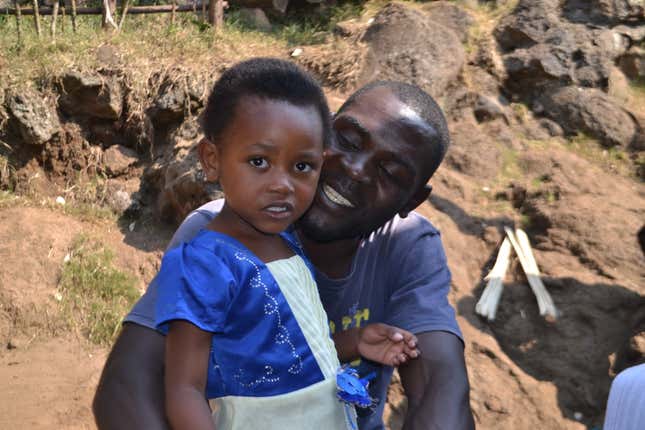
Initial data suggest the intervention had some impact on dads. (The researchers cautioned that fathers’ self-reports of violence were unreliable.) Before Sugira Muryango, mothers reported that only 11% of fathers spent at least some time every day caring for their child, but 26% said they did afterwards. The program also improved fathers’ mental health. A third of all fathers enrolled in Sugira Muryango screened positive for a mental health issue at first. Among dads who received the intervention, only 15% screened positive for mental health problems afterwards. More than half of all mothers enrolled in the study screened positive for mental health problems before Sugira Muryango, compared to 39% of moms in the treatment group.
Improving parents’ mental health was one way through which the researchers hoped to reduce intimate partner violence. After the intervention, 17% of the mothers said they had experienced violence in the past three months, compared to 23% of mothers who didn’t go through the program.
Murray speculated that cultural stigma around reporting violence might be skewing these results. “Because there may be underreporting of enacted violence by males, it may also then be more challenging to detect any significant intervention effects,” she says.
The outside evidence
Despite a growing body of science (pdf) that acknowledges that dads have a special bond with their babies, in places like Rwanda cultural attitudes and gender norms (pdf) often inhibit that bond. Many fathers work long, labor-intensive days and get home after their kids are already asleep. When they’re home, they don’t know how to engage with them, so they mostly don’t. “When you let fathers know, hey there’s more you can do, there’s more you should do, a lot of them will take it up,” says Elliott Friedlander, a researcher who implemented a literacy intervention in Rwanda for Stanford University and is familiar with, but was not involved in, Sugira Muryango.
In 2018, researchers evaluated the long-term impact of an intervention conducted in 2015 targeting Rwandan fathers. The intervention, called Bandebereho, or “Role Model,” was an adaptation of an intervention called Program P, developed by Promundo, REDMAS, and CulturaSalud in Latin America. In Rwanda, it involved small group discussions about fatherhood, masculinity, and sexual, reproductive, and maternal health, structured around a 15-session curriculum adapted from research work done by Promundo. The impact evaluation found that 21 months after the intervention, women experienced less intimate partner violence, men went to more antenatal clinic visits with their wives, and men reported better supporting their wives during pregnancy.
The researchers concluded that “culturally adapted gender-transformative interventions with men and couples can be effective at changing deeply entrenched gender inequalities and a range of health-related behavioral outcomes.”
Other interventions targeting fathers haven’t been as successful. Barker cites the examples of Brazil, South Africa, and Bolivia, where Promundo and its partners tried to adapt Program P by recruiting new or expectant fathers in poor urban centers into regular reflection exercises and small group discussions. They found it too difficult to get most fathers to show up to the sessions, so they ended up shifting to a home-visiting model instead. Urban fathers often work long hours outside the home and don’t have time to come to group sessions, says Barker, or think to themselves, “I may be involved in other ways but I don’t have time for this.”
Barker says the context of rural Rwanda better lends itself to successful interventions, because rural workers often have more free time due to the cyclical nature of their work as farmers or cattle herders, for example, and because the country “has a culture around community service,” a practice known as umuganda. “Post-genocide, there’s been a very strong presence of the state [in] promoting community-based activities, and when the government tells people ‘you should come to this,’ the vast majority come,” he explains.
According to Sugira Muryango’s Shauna Murray, getting fathers involved in child-rearing and household tasks has been one of the biggest challenges but also one of the biggest successes of the program. When fathers become more involved, “that’s probably the most unique part of our program,” she says.
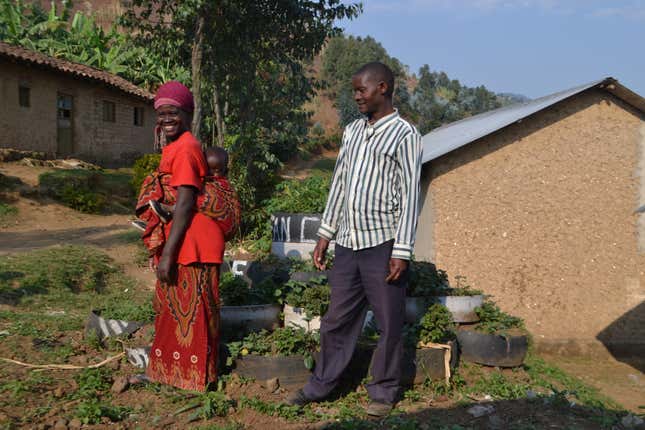
To make sure that both parents attended the modules, Sugira Muryango coaches arranged their visits around fathers’ work schedules. The modules are full of visuals and messages specifically targeted at fathers.
In some cases, FXB sent male coaches to speak to particularly recalcitrant dads. The goal was to communicate to the father that “he matters in terms of his children thriving,” says Theresa Betancourt, the developer and principal investigator of Sugira Muryango and a professor at the Boston College School of Social Work.
In some cases, that still wasn’t enough. Verene Iyamumpaye, a coach in Kayove village, talks about wasted afternoons waiting for fathers who never showed up to their appointments because they were out drinking with friends instead. And yet, the messaging often gets across in the end, she says, when men began seeing improvements around their home as a result of Sugira Muryango. In those cases, says Iyamumpaye, “they came to like the discussions and then tried to respect time.” On average, Sugira Muryango fathers completed 70% of the modules. “In some cases, men would be the ones to call us to remind us about their appointment.”
The challenges
A big problem is that public data on poverty and health is unreliable in Rwanda. A recent Financial Times investigation (paywall) accused the government of manipulating data to hide an increase in poverty between 2010 and 2014. (The government and the World Bank have denied the allegations, and Kagame has called the report “Western propaganda.”)
It’s not clear that NECDP has enough money to support the kind of infrastructure investments it takes to double the number of kids in ECD centers over the next four years. It’s also hard to make sure that the quality of the programs stays consistent across the country, especially given that many childcare workers are unpaid volunteers. NECDP’s yearly budget for ECD program implementation is about 15.9 billion RWF ($17.2 million), but Declercq says a lot of that is earmarked for programs targeting malnutrition.
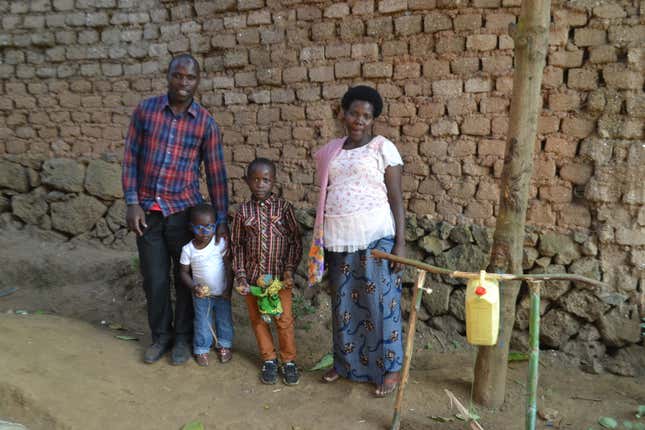
Sharon Kagan is a professor of early childhood education and family policy at Columbia University. In a report called The Early Advantage 2, she compared the successful ECD and care systems of six countries (Australia, England, Finland, Hong Kong, Singapore, and South Korea) and identified five “pillars” they all had in common. One is stable governance, strong support for ECD and care, and adaptive government structures and policymaking around ECD. This means that, for any comprehensive ECD strategy to work, it needs strong government support and leadership, and Rwanda has that in spades. But when it comes to at least two elements Kagan considers crucial—funding and data—Rwanda comes up short.
To have a meaningful effect on poverty rates, Sugira Muryango will have to get a lot bigger. In September, it is increasing its size by nearly 10 times, from an initial CRT group of 1,049 households to almost 10,000—every single eligible Ubudehe 1 household with a child between birth and three in Rubavu, Ngoma, and Nyanza. This time, the program will be delivered via a large government volunteer workforce called the Friends of the Family, with an eye towards a nationwide expansion if things go well.
There’s no guarantee that it will. The Friends of the Family volunteers need to deliver the Sugira Muryango intervention to 10,000 households and collect data on father engagement and presence, hygiene, play, measurements of child height and weight, disabilities, and more. They’ll share the data with local and sector supervisors, who will then send it onto the main FXB team in Kigali to be analyzed.
This means the Sugira Muryango team will need to train a new group of 2,822 unpaid and overextended workers. Despite the fact that they have volunteered for their position, the Friends of the Family workforce is already in charge of social protection issues for the government, meaning any work they do for Sugira Muryango is extra. The cost of the intervention per family, which is expected to go down at scale, will still be about $199 per family, which is expensive. The government will provide in-kind support, through office spaces, volunteers, and the help of local officials in identifying families, but the bulk of the cost will be paid for by a group of international funders that includes the Lego Foundation and Saving Brains.
Historically, small parent-coaching interventions don’t scale well. “Doing a relatively high-quality pilot project and evaluating it well is not easy but it’s doable,” says Sam Sternin, a freelance behavior change specialist. “Where a lot of projects break down is when they try to scale up and the quality goes down.”
At this stage, the Sugira Muryango team knows almost every community-based volunteer and every family, which seems feasible with only about 1,000 families and 118 coaches. They know when someone’s child gets sick and they send flowers when a family member dies. Part of its effectiveness is its intimacy. It is easier to train 100 workers than 3,000.
The goal of any home-visiting, parent-coaching experiment is to change behavior at scale; but any time you do that, you are also changing the socio-cultural environment of the country. Parenting isn’t done in a vacuum. In Rwanda, for example, respect for elders is important. But once you teach kids to ask questions, and teach parents that kids have a right to expect certain things from you, what happens? “It smacks of cultural imperialism,” says Stanford’s Friedlander, speaking generally about behavior-change interventions, not specifically about Sugira Muryango. “What we’re asking parents to do is to fundamentally change the way they interact with children. What is that going to do to the whole culture that has developed over hundreds, if not thousands, of years? I personally wrestle with that.”
Fidèle Rutayisire, executive director of Rwanda Men’s Resource Centre, is a father of four. He disagrees with Friedlander’s criticism. “In Rwandan culture, we have good practices in parenting, but you also have… negative cultural norms,” he explains. “So now, we are trying to challenge and to transform those.”
“Our culture should not be kept as it is,” says Rutayisire. “We need to … change, slow by slow, the cultural norms and our patriarchal society.”
“We want fathers to become caregivers.”
The way forward
Just 25 years ago, when many of the Sugira Muryango parents were children, the Rwandan genocide decimated the minority Tutsi population, led to a widespread epidemic of sexual assault and violence against women, and traumatized a generation. Post-traumatic stress disorder is common, if often undiagnosed, and the condition has been linked to higher rates of alcohol and drug abuse, risk of suicide, and depression and anxiety.
Growing up in a violent home, and witnessing violence between parents, places a huge emotional strain on children. It’s considered an “adverse childhood experience,” and it can lead to later mental and physical problems, including with a child’s developing brain, immune system, and heart.
The legacy of the genocide persists, and imbues the country’s ECD policy with a unique sense of urgency and gravitas, NECDP’s Declercq says. “It’s almost a feeling of not wasting time. If we left the genocide, now we have to be building everywhere else.”
“We know where we came from, and we know how violent and destructive it had been for a lot of people,” she adds, “but we also know now where we want to go. In that sense, it has impacted the vision and the wishes and the dreams for the children of this country.”
Earlier this year, during the commemoration of the 25th anniversary of the genocide, president Paul Kagame said that “our children enjoy the innocence of peace. They know trauma and violence only from stories. Our aspirations rest in this new generation.” It’s a popular thing for a politician to say, but in Rwanda, there’s a plan in place to test it.
Read more from our series on Rewiring Childhood. This reporting is part of a series supported by a grant from the Bernard van Leer Foundation. The author’s views are not necessarily those of the Bernard van Leer Foundation.
